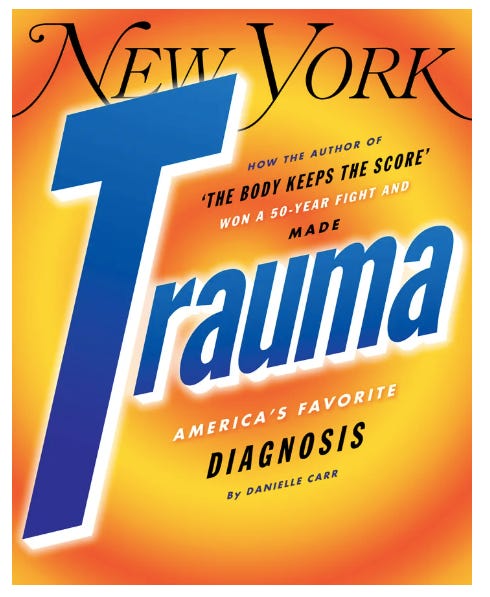Okay my buddy Jessie Roth from IDHA sent this article to me yesterday and at 3am I was still thinking about it and I woke up from very little sleep thinking about it some more. I like the author, she's sharp and connects the satisfying dots and leaves you guessing what’s coming, but there's something about this critique that gets under my skin, into my body, as it were.
Getting to play therapist and professor, the more I study and practice mental health paradigms the more I end up in agreement with old man Foucault when he puts together the words power/knowledge. When you’re talking about anything in the mental health system you can't separate the two of them if you want to understand how they rose to dominance and the effect they are having on people.
The biomedical model of psychiatry wouldn't be so offensive and dangerous if it wasn't allied with the drug companies and the medical industrial complex and literally controlling our lives and the way we think about our inner worlds. I can get down with the idea that there are biological origins to some things that get called Serious Mental Illness, but when we invest tons of money into looking at gene sequencing or new versions of the same old drugs, rather than trying to make people’s lives materially better, that’s about who has the power. If society was structured differently we would prioritize taking care of people rather than drugging them and locking them up.
Cognitive Behavior Therapy wouldn't be so bad if it wasn't so ubiquitous and shutting out space for so many other more creative models that have a harder time fitting into short term care and insurance reimbursement. So much of what gets called “Evidenced Based Practice” seems to exist in this narrow window of the human experience that fits well into double blind research studies but not into the rest of our social context.
When I read the history of Systemic Family Therapy from the 50s-70s it's full of powerful insights about the dynamics that contribute to what today gets called Serious Mental Illness, but as a popular model back in the 70s, under the dominant psychoanalytic frame, it was actually oppressive to all these families, especially mothers, and paved the way for the NAMI backlash of the 80s.
Even the Mental Health Recovery Movement, which started out with lone powerful voices like schizophrenia survivor Pat Deegan, ended up morphing into something policy makers could use to kick struggling people off their services, flipping the polyvalent meaning of “to recover” into something neoliberal and sinister. Power/Knowledge.
So when I read an article celebrating and critiquing Bessel van der Kolk for popularizing trauma as a diagnosis, and proclaiming that it's watered down useful language for everyone to relate to, I appreciate the critique, and there’s definitely something to it, but I'm also like: for fucks sake, how are we going to change the way people think about power if we don’t have language to talk about trauma? And then I think about my clients who benefit from the trauma informed models I use with them, I get to see most days how trauma awareness and somatic awareness and Internal Family Systems frameworks are practices of freedom and liberation.
What I liked about Danelle Carr’s article was that it was both a takedown of the kind of celebrity guru culture that inevitably seems to develop in our capitalist society and the way complex ideas can be watered down to filter into the mainstream, but it made a compelling argument that, for the moment at least, Trauma is a winning narrative in our culture. It fits. I woke up this morning thinking about the responsibility of what that means, what are we going to do with it? Read the article and let me know what you think.
I recently posted this brief conversation I was having about The Body Keeps the Score when I was working at the Center for Practice Innovations at NYSPI trying to wrap my head around the diagnosis of “non-affective psychotic disorder” and why it wasn’t considered to be a diagnosis related to trauma. (Spoiler: The Power/Knowledge of Biopsychiatry)






I think that this impulse to put boundaries around "trauma" as this article seems to want to do is basically reactionary and unhelpful. The author complains that "these ideas...posit a ubiquity of trauma that seems to leave hardly anyone in the “non-traumatized” category." But they don't explain why they feel that it is important to have a "non-traumatized" category. Perhaps to some extent, to be a human is to experience trauma -- or, at least, to be human in the modern age of capitalist catastrophe. And it is a spectrum, not a binary. The author complains that right wingers have adopted the concept. They write this as if its a criticism of van der Kolk: "In fact, rather than treating trauma as an ideological weapon of the left, now the right wants in on it too." But if der Kolk's theory is correct, why would it cleave to people of one political tendency? People of all persuasions have experienced trauma, of course. This criticism doesn't make sense, if you stop to think about it. It smacks of the "false memory syndrome" people of the 90s, discussed here, who I think did a lot of damage in their quest to defend abusers from facing any accountability. Even today there are some people who think that DID isn't a "real" diagnosis even though there's been plenty of empirical support for it since the eighties. Its stigmatizing and gaslighting. The author seems to want to resurrect this old reactionary handwringing & pearlclutching that only ends up invalidating people and hurting them.
I think people always jump to ‘critique’ as a mode of discourse because we’ve been trained towards endless scepticism